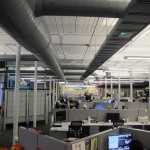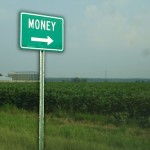N.H.’s Productivity Weakening As Neighboring Economies Grow
New Hampshire may have weathered the recession relatively well, but as other states’ economies are growing, New Hampshire’s is slowing down. That’s the word from the Center for Public Policy Studies, which released a report this week outlining some discouraging trends in New Hampshire’s economy. One of the study’s authors, Dennis Delay, spoke with NHPR’s Brady Carlson about the study.
Delay says the CPPS turned to the celebrated economist Robert Solow, whose model of economic growth relies on three elements: (1) the availability of labor; (2) an increase in skills and productivity of that labor force; and (3) investment by companies in things like machinery and software.
In the 1980s and 1990s, Delay says, New Hampshire excelled in all three of these metrics. The labor force was growing fast thanks to in-migration from Massachusetts and other New England states, and those incoming residents were very highly educated, making New Hampshire one of the most highly educated states in the nation. Furthermore, money was flowing into the state to grow the facilities they worked in.
But “what we found out,” Delay says, “is that those three things have changed fundamentally over the last couple years, and there’s every reason to think that they probably won’t improve in the near term unless something is done from a public policy perspective.”
Over the last decade, Delay says, all three of those indicators have slowed. First, fewer people are moving to New Hampshire, meanwhile, the current population is aging out of the workforce. On top of that, as younger Granite Staters leave the state for college and choose not to return, the workforce’s level of education is declining, too – making New Hampshire less productive. And finally, while investment in facilities and technology has increased in other states, it has slowed in New Hampshire.
“The bottom line is,” Delay says, “people have had this perception of New Hampshire as a high growth, high value added state that we have always come out of recessions faster than the other states around us, and none of those things are true any longer. They actually have all changed.”As New Hampshire’s growth has slowed, Vermont has been adding jobs, dropping the unemployment rate below New Hampshire’s. And, according to Delay, economic conditions have been “more vibrant” in Massachusetts in the last year than they have been in New Hampshire.
Delay says the Center wants policy makers to pay attention to these issues. They recommend policies that would lower the cost of living, including health care and housing costs; altering tax structures to encourage business investment; and investing in higher education, worker training, and infrastructure like public transportation.
But which specific policies would be most effective for New Hampshire? Delay says there’s a good chance the Center for Public Policy Studies will be embarking on a second phase of research, to understand what causes innovation in New Hampshire, and what roadblocks might be getting in the way.


